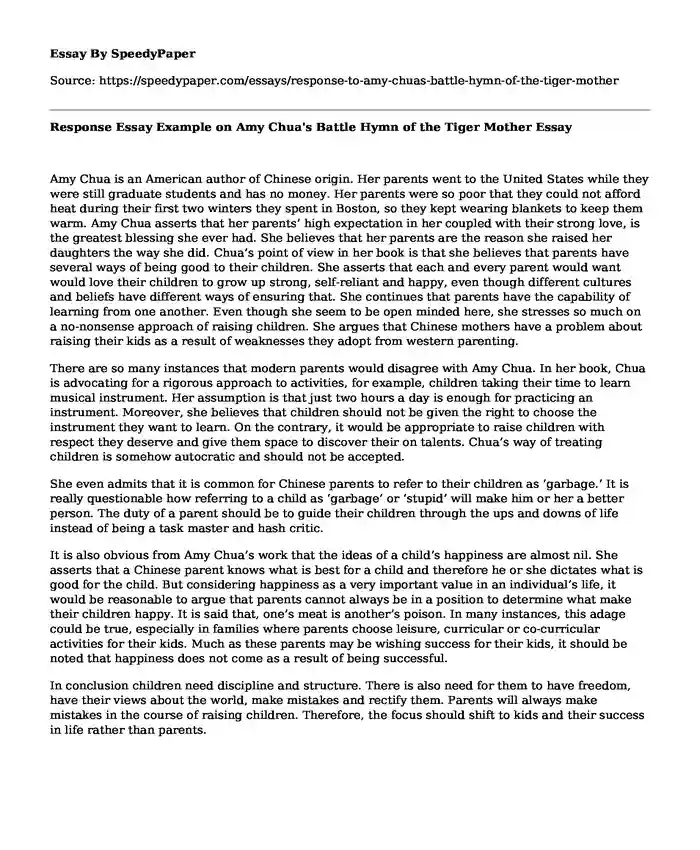
| Essay type: | Response essays |
| Categories: | Literature Biography |
| Pages: | 3 |
| Wordcount: | 578 words |
Amy Chua is an American author of Chinese origin. Her parents went to the United States while they were still graduate students and has no money. Her parents were so poor that they could not afford heat during their first two winters they spent in Boston, so they kept wearing blankets to keep them warm. Amy Chua asserts that her parents’ high expectation in her coupled with their strong love, is the greatest blessing she ever had. She believes that her parents are the reason she raised her daughters the way she did. Chua’s point of view in her book is that she believes that parents have several ways of being good to their children. She asserts that each and every parent would want would love their children to grow up strong, self-reliant and happy, even though different cultures and beliefs have different ways of ensuring that. She continues that parents have the capability of learning from one another. Even though she seem to be open minded here, she stresses so much on a no-nonsense approach of raising children. She argues that Chinese mothers have a problem about raising their kids as a result of weaknesses they adopt from western parenting.
There are so many instances that modern parents would disagree with Amy Chua. In her book, Chua is advocating for a rigorous approach to activities, for example, children taking their time to learn musical instrument. Her assumption is that just two hours a day is enough for practicing an instrument. Moreover, she believes that children should not be given the right to choose the instrument they want to learn. On the contrary, it would be appropriate to raise children with respect they deserve and give them space to discover their on talents. Chua’s way of treating children is somehow autocratic and should not be accepted.
She even admits that it is common for Chinese parents to refer to their children as ‘garbage.’ It is really questionable how referring to a child as ‘garbage’ or ‘stupid’ will make him or her a better person. The duty of a parent should be to guide their children through the ups and downs of life instead of being a task master and hash critic.
It is also obvious from Amy Chua’s work that the ideas of a child’s happiness are almost nil. She asserts that a Chinese parent knows what is best for a child and therefore he or she dictates what is good for the child. But considering happiness as a very important value in an individual’s life, it would be reasonable to argue that parents cannot always be in a position to determine what make their children happy. It is said that, one’s meat is another’s poison. In many instances, this adage could be true, especially in families where parents choose leisure, curricular or co-curricular activities for their kids. Much as these parents may be wishing success for their kids, it should be noted that happiness does not come as a result of being successful.
In conclusion children need discipline and structure. There is also need for them to have freedom, have their views about the world, make mistakes and rectify them. Parents will always make mistakes in the course of raising children. Therefore, the focus should shift to kids and their success in life rather than parents.
Cite this page
Response Essay Example on Amy Chua's Battle Hymn of the Tiger Mother. (2017, Oct 09). Retrieved from https://speedypaper.com/essays/response-to-amy-chuas-battle-hymn-of-the-tiger-mother
Request Removal
If you are the original author of this essay and no longer wish to have it published on the SpeedyPaper website, please click below to request its removal:
- Free Essay Sample on Islamic Charitable Organizations
- Intangible Drilling Costs Essay
- Cultural Difference and Postmodern Parody - Essay Example for You
- The Walkout Before the Storm - Creative Writing Essay Example
- WISDOM WILL ADDRESS ME. WISDOM WILL ANSWER THE QUESTIONS
- Essay Sample on History of Deaf Education
- Paper Example: A Trade Deficit
Popular categories




